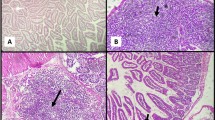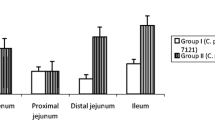Abstract
Cryptosporidium species is a prime cause of diarrheal disease in individuals with competent immunity. In patients with compromised immunity, infections are more severe particularly in developing countries. Wheat germ oil was described to have antiparasitic effect. This study was done to evaluate the possible role of wheat germ extracts in Cryptosporidium parvum (C. parvum) infected immunocompromised mice. Thirty white albino mice were classified into six groups as follow: four study groups, all immunosuppressed and infected with C. parvum oocysts. These four groups received treatments as follow: Group (I): treated with nitazoxanide. Group (II): treated with wheat germ oil. Group (III): treated with wheat germ extracted by hexane. Group (IV): treated with wheat germ extracted by ethanol. The remaining two groups were immunosuppressed control groups as follow: Group (V): only infected with C. parvum oocysts (Positive control). Group (VI): non-infected (Negative control). Stool samples were collected and examined to detect oocyst and the ileocecal region was subjected to histopathological and immunohistochemical examination. Wheat germ extracts showed a statistically significant effect against C. parvum specially wheat germ oil with P value: < 0.001, this effect was also confirmed by pathological and immunohistochemical examinations. C. parvum has an influence on human health by its effect in diarrheal disease. Wheat germ oil and its extracts has proved to be a reliable herb for C. parvum. treatment confirmed by different methodologies.

















Similar content being viewed by others
Data availability
The set of data used in this research is available upon request from the corresponding author.
References
Abdel-Gawad SK (2015) Therapeutic and protective effect of wheat germ oil on L-arginine induced acute pancreatitis in adult albino rats. J Cell Sci Therapy. https://doi.org/10.4172/2157-7013.s8-004
Ajjampur SSR, Png CW, Chia WN, Zhang Y, Tan KSW (2016) Ex vivo and in vivo mice models to study blastocystis spp. adhesion, colonization and pathology: closer to proving koch’s postulates. PLoS One. https://doi.org/10.1371/journal.pone.0160458
Amadi B, Mwiya M, Sianongo S, Payne L, Watuka A, Katubulushi M, Kelly P (2009) High dose prolonged treatment with nitazoxanide is not effective for cryptosporidiosis in HIV positive Zambian children: a randomised controlled trial. BMC Infect Dis. https://doi.org/10.1186/1471-2334-9-195
Anwar MM, Mohamed NE (2015) Amelioration of liver and kidney functions disorders induced by sodium nitrate in rats using wheat germ oil. J Radiation Res Appl Sci. https://doi.org/10.1016/j.jrras.2014.11.004
Barnes JM, Paget GE (1965) 2 mechanisms of toxic action. Progress Med Chem 4(C):18–38. https://doi.org/10.1016/S0079-6468(08)70166-8
Cersosimo E, Wilkowske CJ, Rosenblatt JE, Ludwig J (1992) Isolated antral narrowing associated with gastrointestinal cryptosporidiosis in acquired immunodeficiency syndrome. Mayo Clinic Proc. https://doi.org/10.1016/S0025-6196(12)60463-7
Chatterjee I, Kumar A, Castilla-Madrigal RM, Pellon-Cardenas O, Gill RK, Alrefai WA, Dudeja PK (2017) Cdx2 upregulates slc26a3 gene expression in intestinal epithelial cells. Am J Physiol Gastrointestinal Liver Physiol. https://doi.org/10.1152/ajpgi.00108.2017
Checkley W, White AC, Jaganath D, Arrowood MJ, Chalmers RM, Chen XM, Houpt ER (2015) A review of the global burden, novel diagnostics, therapeutics, and vaccine targets for cryptosporidium. Lancet Infect Dis. https://doi.org/10.1016/S1473-3099(14)70772-8
Di Genova BM, Tonelli RR (2016) Infection strategies of intestinal parasite pathogens and host cell responses. Front Microbiol. https://doi.org/10.3389/fmicb.2016.00256
Feng Y, Ryan UM, Xiao L (2018) Genetic diversity and population structure of cryptosporidium. Trends Parasitol. https://doi.org/10.1016/j.pt.2018.07.009
Fox LM, Saravolatz LD (2005) nitazoxanide: a new thiazolide antiparasitic agent. Clin Infect Dis. https://doi.org/10.1086/428839
Gargala G (2008) Drug treatment and novel drug target against Cryptosporidium. In Parasite (Vol. 15). https://doi.org/10.1051/parasite/2008153275
Ghafoor K, Özcan MM, AL-Juhaımı F, Babıker EE, Sarker ZI, Ahmed IAM, Ahmed MA (2017) Nutritional composition, extraction, and utilization of wheat germ oil: A review. Eur J Lipid Sci Technol. https://doi.org/10.1002/ejlt.201600160
Grant J, Mahanty S, Khadir A, Maclean JD, Kokoskin E, Yeager B, Ward BJ (2001) Wheat germ supplement reduces cyst and trophozoite passage in people with giardiasis. Am J Tropical Med Hygiene. https://doi.org/10.4269/ajtmh.2001.65.705
Henriksen SA, Pohlenz JFL (1981) Staining of cryptosporidia by a modified Ziehl-Neelsen technique. Acta Veterinaria Scandinavica. https://doi.org/10.1186/BF03548684
Hyoh Y, Nishida M, Tegoshi T, Yamada M, Uchikawa R, Matsuda S, Arizono N (1999) Enhancement of apoptosis with loss of cellular adherence in the villus epithelium of the small intestine after infection with the nematode Nippostrongylus brasiliensis in rats. Parasitology. https://doi.org/10.1017/S003118209900462X
Karabacak M, Kanbur M, Eraslan G, Soyer Sarica Z (2011) The antioxidant effect of wheat germ oil on subchronic coumaphos exposure in mice. Ecotoxicol Environ Safety. https://doi.org/10.1016/j.ecoenv.2011.07.002
Khan LM, Hanna MA (1983) Expression of oil from oilseeds—a review. J Agric Eng Res 28(6):495–503
Kotloff KL (2017) The Burden and Etiology of diarrheal illness in developing countries. Pediatr Clin North Am. https://doi.org/10.1016/j.pcl.2017.03.006
Madbouly Taha N, Salah A, Yousof HA, El-Sayed SH, Younis AI, Ismail Negm MS (2017) Atorvastatin repurposing for the treatment of cryptosporidiosis in experimentally immunosuppressed mice. Exp Parasitol 181:57–69
Moustafa MA (2003) Role of wheat germ agglutinin (WGA) in treatment of experimental cryptosporidiosis. J Egyptian Soc Parasitol, 33(2)
Nachbar MS, Oppenheim JD (1980) Lectins in the United States diet: a survey of lectins in commonly consumed foods and a review of the literature. Am J Clin Nutr. https://doi.org/10.1093/ajcn/33.11.2338
Niu LY, Jiang ST, Pan LJ, Pang M (2013) Characterization of wheat germ oil in terms of volatile compounds, lipid composition, thermal behavior, and structure. Int J Food Properties. https://doi.org/10.1080/10942912.2011.608141
O’Connor RM, Shaffie R, Kang G, Ward HD (2011) Cryptosporidiosis in patients with HIV/AIDS. AIDS 25(5):549–560. https://doi.org/10.1097/QAD.0B013E3283437E88
Ortega-Barria E, Ward HD, Keusch GT, Pereira MEA (1994) Growth inhibition of the intestinal parasite Giardia lamblia by a dietary lectin is associated with arrest of the cell cycle. J Clin Investig 94(6):2283–2288. https://doi.org/10.1172/JCI117591
Osman EEA, Morsi EA, El-Sayed MM, Gobouri A, Abdel-Hameed ES (2021) Identification of the volatile and nonvolatile constituents of Schinus molle (L.) fruit extracts and estimation of their activities as anticancer agents. J Appl Pharm Sci 11(7):163–171
Özcan MM, Ören D (2019) Comparative of physico-chemical properties of wheat germ oil extracted with cold press and supercritical co2 extraction. Iranian J Chem Chem Eng, 38(6)
Pereira ME, Kabat EA (1979) Immunochemical studies on lectins and their application to the fractionation of blood group substances and cells. CRC Critical Rev Immunol
Pinto DJ, Vinayak S (2021) Cryptosporidium: host-parasite interactions and pathogenesis. Current Clinical Microbiol Reports. https://doi.org/10.1007/s40588-021-00159-7
Quah JX, Ambu S, Lim YA, Mahdy MA, Mak JW (2011) Molecular identification of Cryptosporidium parvum from avian hosts. Parasitology 138(5):573–577. https://doi.org/10.1017/S0031182010001691 (Epub 2011 Jan 14 PMID: 21232175)
Ramos-Vara JA (2005) Technical aspects of immunohistochemistry. Vet pathol 42(405):426
Salam AA, Kadery E, Sabry NM, Ismail KA, Mohammad OS, Khalifa AM (2018) A study on the amoebicidal effect of Nigella Sativa aqueous and alcoholic extracts and wheat germ agglutinin on pathogenic acanthamoeba. J Pathol Pathogenic Res, 1(1)
Sasahara T, Maruyama H, Aoki M, Kikuno R, Sekiguchi T, Takahashi A, Inoue M (2003) Apoptosis of intestinal crypt epithelium after Cryptosporidium parvum infection. J Infect Chemother. https://doi.org/10.1007/s10156-003-0259-1
Sharon N (1996) Carbohydrate-lectin interactions in infectious disease. In Advances in Experimental Medicine and Biology (Vol. 408). https://doi.org/10.1007/978-1-4613-0415-9_1
Soliman HA, Ahmed RR, Gomaa HA, Ali AT (2014) Assessment of the chemo-preventive effects of various plant constituents against doxorubicin-induced toxicity in rats. J Am Sci, 10
Sparks H, Nair G, Castellanos-Gonzalez A, White AC (2015) Treatment of cryptosporidium: What we know, gaps, and the way forward. Current Tropical Med Rep. https://doi.org/10.1007/s40475-015-0056-9
Tanaka S, Nishimura M, Ihara F, Yamagishi J, Suzuki Y, Nishikawa Y (2013) Transcriptome analysis of mouse brain infected with toxoplasma gondii. Infect Immunity. https://doi.org/10.1128/IAI.00439-13
Tarazona R, Blewett DA, Carmona MD (1998) Cryptosporidium parvum infection in experimentally infected mice: Infection dynamics and effect of immunosuppression. Folia Parasitologica, 45(2)
Funding
This work was fully funded by authors, and there were no contributing funding agencies.
Author information
Authors and Affiliations
Contributions
All the authors contributed in samples collection, processing, data analysis and manuscript writing.
Corresponding author
Ethics declarations
Conflict of interest
There was not conflict of interests declared on authors’ behalf.
Ethics approval
The study has obtained approval from the ethical committee of Theodor Bilharz Research Institute (TBRI), Giza, Egypt PT (605).
Additional information
Publisher's Note
Springer Nature remains neutral with regard to jurisdictional claims in published maps and institutional affiliations.
Rights and permissions
About this article
Cite this article
Abdelmaksoud, H.F., Osman, E.E.A., Abdel-Hameed, S.S. et al. In vivo evaluation of anticryptosporidial effects of wheat germ extracts in immunocompromised mice. J Parasit Dis 46, 833–844 (2022). https://doi.org/10.1007/s12639-022-01502-5
Received:
Accepted:
Published:
Issue Date:
DOI: https://doi.org/10.1007/s12639-022-01502-5




